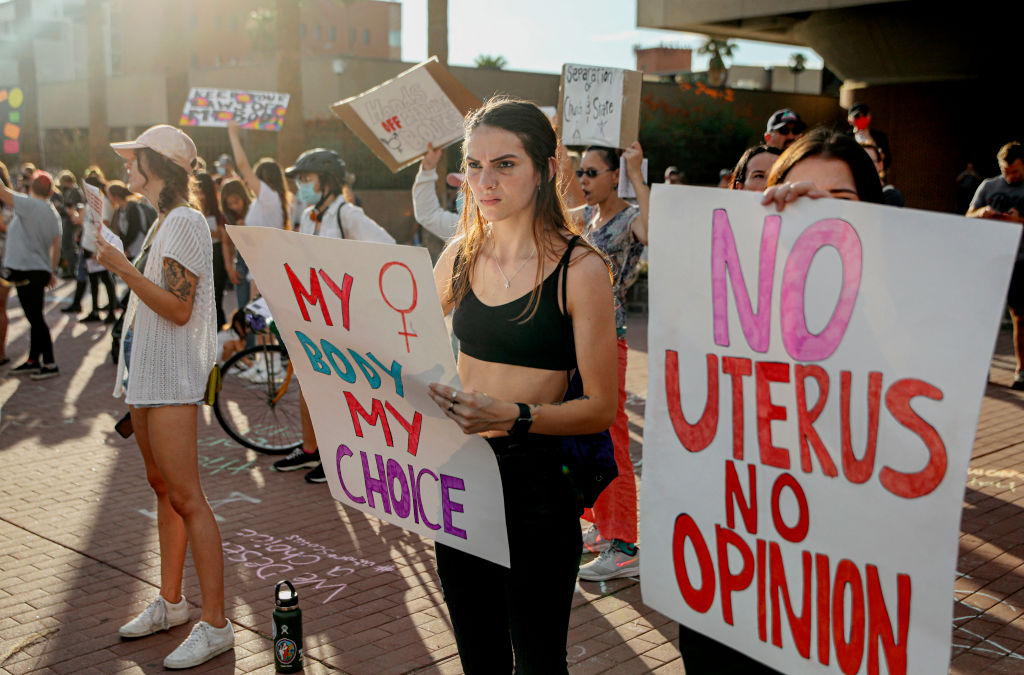Happy Wednesday! Congratulations to the UConn Huskies on winning the NCAA men’s basketball championship on Monday night. It’s the first time a team has won back-to-back titles since 2007. To commemorate, enjoy this display of UConn pride from the late, great Joe Lieberman, via C-SPAN’s Howard Mortman.
Up to Speed
- Could Joe Biden miss the deadline to be on Ohio and Alabama’s November ballots? Because of the date of the Democratic National Convention, it’s possible. Last week, Ohio’s secretary of state warned the incumbent president that the deadline for certifying candidates is August 7, two weeks before the Democratic National Convention, so either the Republican-controlled legislature would need to create an exception for Biden or Democrats would have to move up their convention. The Biden campaign did not seem worried, telling the Associated Press it is “confident that Joe Biden will be on the ballot in all 50 states,” though it is unclear why the campaign is so optimistic. Then on Tuesday, Alabama’s secretary of state gave a similar warning, since its deadline is days before the convention’s start date. The Biden campaign told CNN that election officials in Alabama have the authority to authorize “provisional ballot access certifications” before conventions conclude—but the state pushed back on that claim, saying “there are no ‘provisional certifications’ for candidates.”
- Biden’s current Health and Human Services secretary, Xavier Becerra, will likely begin a run in California’s 2026 gubernatorial race shortly after the 2024 election wraps up. Becerra and his supporters have indicated to fellow Democrats that he will leave the Biden administration and declare a run for the office after November’s contest, according to Politico. Becerra, who served as California’s attorney general and represented it in Congress prior to his appointment to Biden’s Cabinet, would join a crowded field that already consists of high-ranking Democrats in the Golden State.
- Two New York appeals judges on Monday and Tuesday separately rejected attempts by former President Donald Trump to delay his hush money trial there. In the Monday ruling, Justice Lizbeth González denied a request from the former president’s lawyers, who argued that Trump faces “real potential prejudice” in the heavily Democratic Manhattan. Justice Cynthia Kern issued a ruling a day later, throwing out an argument from the legal team that she should put off the trial while Trump contends with a gag order from Judge Juan Merchan, who is presiding over the case. The trial is set to begin Monday with jury selection.
- Rep. Marjorie Taylor Greene is escalating her threats to eject Speaker Mike Johnson from his position. In a five-page letter to her fellow House Republicans Tuesday, the Georgia representative blasted Johnson for allowing “a complete and total surrender” on several issues, including cutting spending deals with the Democratic majority in the Senate. “If these actions by the leader of our conference continue, then we are not a Republican Party—we are a uniparty that is hellbent on remaining on the path of self-inflicted destruction,” she wrote. “I will neither support nor take part in any of that, and neither will the people we represent.” Greene had previously filed a motion to vacate against Johnson last month, but she did not privilege it, calling it “more of warning than a pink slip.” But Johnson may have a way out. As Dispatch Politics reported Monday, Democrats may bail Johnson out if he brings up the foreign aid bill that previously passed the Senate.
- Tim Sheehy, the leading Republican candidate in Montana’s Senate primary, has said he still has a bullet in his arm from when he served as a Navy SEAL in Afghanistan in 2012. But a Sunday report from the Washington Post revealed that Sheehy told a National Park Service ranger in 2015 that he sustained the wound after dropping his Colt .45 revolver on a trip to Glacier National Park, causing the gun to fire. He then told the Post that he had indeed received the wound in combat and lied to the ranger to protect his squad mates, who he thought may get “dragged through the mud” in an investigation into the circumstances surrounding his being shot in combat. Sheehy is running for the opportunity to challenge Democratic Sen. John Tester, who the Cook Political Report has said is a vulnerable three-term incumbent, rating his race as a toss-up.
Arizona’s Abortion Ruling Intensifies Electoral Stakes

The Arizona Supreme Court released a bombshell ruling on abortion on Tuesday that sent political shockwaves through the battleground state.
In a 4-2 decision, the court held the state’s abortion law that was in effect before Roe v. Wade but dormant since the 1973 decision is enforceable in the wake of the 2022 Dobbs decision overturning Roe. As the majority opinion noted, the law was first enacted by the territorial legislature in 1864 and modified before it was adopted by the state in 1913, codified in 1928, and affirmed by the legislature in 1977. The text of a 15-week abortion law the Arizona Legislature enacted in 2022 explicitly said the “act does not … Repeal, by implication or otherwise” the more restrictive pre-Roe law that prohibits abortion throughout pregnancy with an exception only to save the life of the mother.
The ruling could play a pivotal role in the fight for the White House, Senate, and House this November. Many Arizona Republicans from across the political spectrum called on the state legislature to pass some compromise on abortion law.
GOP Senate candidate Kari Lake, who supported the state’s pre-Roe abortion law when she ran for governor in 2022 and as recently as November 2023, said in a statement: “I oppose today’s ruling, and I am calling on [Democratic governor] Katie Hobbs and the State Legislature to come up with an immediate common sense solution that Arizonans can support. Ultimately, Arizona voters will make the decision on the ballot come November.”
Former Arizona Gov. Doug Ducey, a Republican, wrote on Twitter: “I signed the 15-week law as Governor because it is thoughtful policy, and an approach to this very sensitive issue that Arizonans can actually agree on. The ruling today is not the outcome I would have preferred, and I call on our elected leaders to heed the will of the people and address this issue with a policy that is workable and reflective of our electorate.”
The ruling won’t take effect for about two months, and the state’s Democratic attorney general and county prosecutors and sheriffs in the state’s most populous areas said they do not intend to enforce the pre-Roe abortion ban even if it does take effect. But it’s unclear if the legislature, narrowly controlled by Republicans, and the Democratic governor will reach any sort of compromise in the coming weeks. In a joint statement, Arizona Senate President Warren Petersen and House Speaker Ben Toma said the state supreme court decision was “one based solely on the text of the law — it was not a policy statement. It’s important to note, there is at least a 60-day waiting period before any change in the existing law occurs. During this time, we will be closely reviewing the court’s ruling, talking to our members, and listening to our constituents to determine the best course of action for the legislature.”
It’s difficult to see the GOP legislature supporting a policy less protective of unborn life than the 15-week abortion limit currently in effect, and it’s equally difficult to imagine Hobbs codifying any abortion limit before Arizona voters in a November referendum will likely approve an unfettered right to abortion. The proposed constitutional amendment up for a vote would allow abortions anytime before an unborn child can survive outside the womb and would explicitly create a right to abortion after viability whenever a health care professional (a term not limited to doctors) determines abortion would protect “mental health.” The amendment declares the act “should be liberally construed in furtherance of the fundamental right it establishes.”
Just how much will the Arizona Supreme Court’s ruling and abortion referendum matter downballot in November? It’s not entirely clear. In Michigan in 2022, with a pre-Roe state abortion law being batted around state courts, the state’s constitutional referendum to establish a broad right to abortion passed overwhelmingly and likely boosted turnout for Democrats across the state.
On the other hand, a pre-Roe abortion law similar to Arizona’s was in effect in the battleground state of Wisconsin in 2022, when Republican U.S. Sen. Ron Johnson and all House GOP Republicans were reelected. Wisconsin Republicans flipped one House seat from blue to red, but incumbent Democratic Gov. Tony Evers was also reelected.
But however the issue actually plays out in Arizona in 2024, there is no doubt that Republicans in the state and across the country are running scared from it.
The GOP Follows Donald Trump’s Lead on Abortion
The Arizona abortion ruling came just one day after presumptive GOP presidential nominee Donald Trump attempted to wash his hands of the abortion issue altogether.
On Monday, Trump declined to endorse a 15-week federal abortion limit backed by national pro-life groups and Sen. Lindsey Graham. “My view is now that we have abortion where everybody wanted it from a legal standpoint,” Trump said Monday in a four-minute video on Truth Social. “The states will determine by vote or legislation or perhaps both, and whatever they decide must be the law of the land. In this case, the law of the state. Many states will be different. Many will have a different number of weeks or some will have more conservative than others, and that’s what they will be.” Asked directly on Wednesday by a reporter if he would “sign a national abortion ban if Congress sent it to your desk,” Trump replied: “No.”
Graham said he “respectfully” disagreed with Trump, and Marjorie Dannenfelser, president of Susan B. Anthony Pro-Life America, said she was “disappointed” but would nevertheless work to defeat President Joe Biden and congressional Democrats. Trump lashed out in response, writing on Truth Social that after Dobbs “Marjorie Dannenfelser of SBA, and Lindsey Graham, started saying, ‘No, let’s go back to the Federal Government with 0 weeks,’ and when they got nowhere, they upped it to 6 week, and more recently they upped it to 15 weeks, and were obviously willing to take the number UPWARD, UPWARD, UPWARD because they were getting nowhere with the Democrats.”
But Trump’s history was incorrect. Graham and Dannenfelser had long supported a federal limit on abortion at 20 weeks after conception that congressional Republicans almost unanimously voted for on multiple occasions between 2013 and 2020. Trump himself campaigned on such a limit in 2016, writing at the time that he was committed to “signing into law the Pain-Capable Unborn Child Protection Act, which would end painful late-term abortions nationwide” and set 20 weeks as the threshold for limiting abortions. The 20-week bill became a 15-week bill after the Dobbs decision on the theory that it could save more lives while still garnering enough popular support and help provide a contrast with Democratic support for a right to abortion late in pregnancy.
Trump’s abandonment of any sort of federal limit on abortion doesn’t make him unique among Republicans. The vast majority of Senate Republicans who voted for a 20-week limit balked at supporting Graham’s 15-week bill in the wake of the Dobbs decision.
What’s perhaps more interesting than Trump’s policy positioning is his embrace of pro-choice rhetoric on abortion. During the primary season, he attacked Florida’s Heartbeat Protection Act, a law generally prohibiting abortion after six weeks of pregnancy with several exceptions, as a “terrible thing.” In his Monday statement, Trump said that the “concept of having an abortion in the later months” is “unacceptable,” but he did not encourage his supporters to oppose referenda that effectively create a broad right to late-term abortion. “Do what’s right for your family, and do what’s right for yourself,” Trump said of abortion referenda. On Wednesday, Trump said Florida’s abortion law is “probably going to change … The will of the people, this is what I’ve been saying.”
There are certainly key policy differences between Trump and Biden on abortion—Trump still opposes taxpayer funding of abortion and would not sign a bill establishing a sweeping federal right to abortion. But Trump is giving every indication he thinks the overwhelming majority of abortions—which occur before 15 weeks—should be legal, and more Republicans are following suit. “Today’s ruling is a disaster for women and providers,” Arizona GOP Rep. Juan Ciscomani said in a statement on Tuesday. “In Arizona, our 15 week law protected the rights of women and new life. It respected women and the difficult decision of ending a pregnancy – one I will never personally experience and won’t pretend to understand. As my record shows, I’m a strong supporter of empowering women to make their own healthcare choices and I oppose a national abortion ban.”
The rhetoric from Trump and Ciscomani on abortion is a sign that just because the GOP was a pro-life party before Dobbs doesn’t mean it will remain one after Dobbs.
Notable and Quotable
“KILL FISA, IT WAS ILLEGALLY USED AGAINST ME, AND MANY OTHERS. THEY SPIED ON MY CAMPAIGN!!! DJT”
—Former President Donald Trump in a Truth Social post, commenting on a Congressional fight over FISA reauthorization, April 10, 2024








Please note that we at The Dispatch hold ourselves, our work, and our commenters to a higher standard than other places on the internet. We welcome comments that foster genuine debate or discussion—including comments critical of us or our work—but responses that include ad hominem attacks on fellow Dispatch members or are intended to stoke fear and anger may be moderated.
With your membership, you only have the ability to comment on The Morning Dispatch articles. Consider upgrading to join the conversation everywhere.